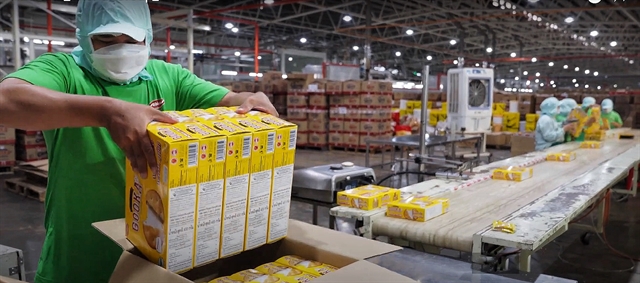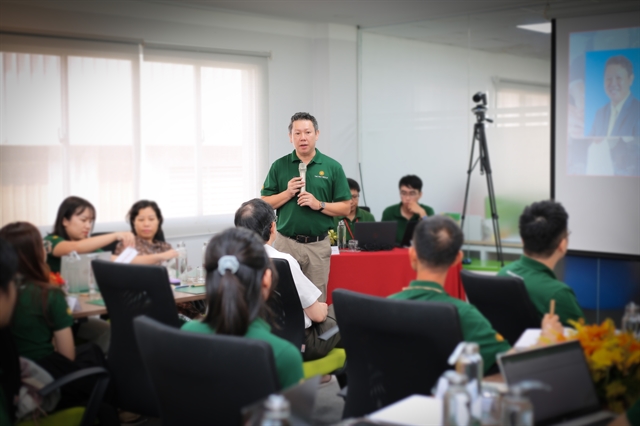 Economy
Economy

Kiều Trinh
HÀ NỘI — In today's business landscape, integrating environmental sustainability, particularly through Extended Producer Responsibility (EPR), is paramount. Join us for an exclusive interview with Ms. Nguyễn Thị Trà My, CEO of PAN Group, a leading corporation in Việt Nam's agriculture and food sector, about the impact of EPR on sustainable business operations, as well as the company's EPR initiatives.
 |
| Ms. Nguyễn Thị Trà My, CEO of PAN Group |
Under the 2020 Environmental Protection Law, businesses must take responsibility not only for products sold, but also for their retrieval, processing and recycling as required by law. Could you share how the company has integrated Extended Producer Responsibility (EPR) into its business strategy and management?
Fulfilling producer responsibilities equates to a company aligning with a sustainable and environmentally friendly path for the future. Since co-founding PAN Group in 2012 and later assuming the role of CEO in 2018, one of the first things I did was displaying the United Nations' 17 Sustainable Development Goals for 2030 on our office wall. When the Vietnamese government planned to implement EPR policies, we fully agreed and supported it. Việt Nam, amidst robust economic development, faces environmental challenges, particularly the increasing waste volume and complex management issues.
PAN Group, with various companies supplying products domestically and internationally, including in demanding markets like Europe and the US, prioritised sustainability in its 2020-2030 development plan. We tasked a dedicated department to ensure compliance with EPR regulations, aiming for efficient resource use and innovative, cost-effective EPR investment.
However, there are challenges facing PAN and other businesses. According to the Ministry of Natural Resources and Environment, March 31st is the registration deadline for the EPR portal, and April 20th is the deadline for contributions to the Vietnam Environment Protection Fund. Yet, uncertainties remain about the fee calculation basis, particularly concerning product and packaging recycling costs, making budgeting difficult for businesses.
Regarding the contribution time to the fund, it's typically in April each year. However, at this point, businesses might not have calculated the volume of products and packaging they've brought to market to serve as the basis for fees. This is because businesses typically wrap up their business activities towards the end of the year. Also, transparency in managing the Vietnam Environment Protection Fund is crucial to foster trust and support from the business community.
In your opinion, how important is EPR in promoting sustainable development? What benefits can adherence to EPR bring to businesses, such as creating new business opportunities or enhancing international cooperation?
I believe EPR plays a crucial role in promoting the adoption of a circular economy model in Việt Nam. Its most significant impact lies not just in environmental protection through packaging collection and processing, but in changing the mindset of production and consumption. It compels manufacturers to redesign products using eco-friendly materials, extending product lifecycles and making them easier to collect, reuse and recycle.
Major markets like the EU have recently considered applying this tool to importers, particularly in the textile industry. This would oblige manufacturers and importers to take responsibility for the entire lifecycle of products consumed in the EU. Similar to the Carbon Border Adjustment Mechanism (CBAM), EPR isn't a standalone policy but part of a series of EU measures aimed at sustainability in commercial activities.
In this scenario, it's clear that we must gradually elevate sustainable standards to meet the demands of the global market. I believe this presents an opportunity if we can adapt our production chains to meet market regulations.
Undoubtedly, the cost of transition is a significant hurdle for businesses. However, in my view, beyond the initial challenges, EPR will yield numerous benefits for businesses. EPR policies will encourage companies to redesign products and packaging to be more environmentally friendly, avoiding materials that pose risks to humans and the environment. Consequently, businesses' products will garner more positive feedback from consumers, aiding entry into discerning markets such as Europe, the US and Japan. Moreover, EPR policies also assist businesses in gradually achieving sustainable development goals, boosting competitiveness, attracting more investors, and cultivating a corporate image aligned with societal and environmental values.
 |
| Product packaging uses recycled packaging at Bibica company, a member of the Pan group. Photo VNS |
Aligned with the government's commitment to the Net Zero pathway by 2050, PAN Group's sustainable development strategy has always prioritised balancing economic, environmental and social interests. Alongside efforts to reduce greenhouse gas emissions in the agricultural sector, which contributes significantly (19%) to total national emissions, we also have specific plans to control solid waste throughout the supply chain.
We are accustomed to meeting increasingly stringent standards in export markets, so there's no reason to doubt that the domestic market will gradually raise standards towards a more sustainable economy.
What solutions has PAN implemented to effectively address waste and pollution issues stemming from agricultural production?
The responsibility of waste management is one of the two provisions that EPR mandates in addition to product and packaging recycling responsibilities. Within the PAN Group, we also have entities falling under this scope, such as Vietnam Fumigation JSC, which operates in the field of plant protection product manufacturing.
Our initial obligation is still to contribute financially to the Vietnam Environment Protection Fund to support waste management. Additionally, to limit the production of packaging and products containing hazardous or non-recyclable materials, we prioritise the use of environmentally-friendly chemicals, strictly avoiding the use of chemicals prohibited in the WHO recommended list or equivalent standards.
We also establish recycling and reuse programmes, as well as collection and return schemes, to facilitate the reuse of packaging and products, helping to minimise environmental emissions.
Has PAN implemented any training and guidance programmes to raise awareness of environmental responsibility and apply environmental protection measures for its community?
Prior to implementing any policies or regulations, especially those regarding sustainable development, effective communication and training are essential. At PAN, we focus not only on our staff but also extend our efforts to the local farming community. Training sessions, workshops and seminars are conducted regularly to educate farmers on the importance of environmental protection.
 |
| Training course to raise awareness of EPR practices at Pan Group. Photo: Pan Group |
We employ diverse training and guidance methods, including face-to-face meetings, online communication via social media platforms, and importantly, information dissemination through product packaging. Emphasising packaging design, we ensure users receive guidance on sorting, recycling and disposal.
Furthermore, PAN organises numerous events and programmes for workers and farmers, including collection and recycling activities. For example, Khang An Foods has established a Recycling Fund to encourage waste sorting habits at the source. In two years, over 4000kg of plastic bottles have been collected for recycling. This initiative significantly enhances environmental responsibility among workers and the community. VNS